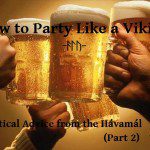Let’s face it: it can be overwhelming to read through the mountains of heathen literature, the Eddas, and all the varying opinionated articles related to heathenism. After all, there is good reason for wanting to understand what we read; that understanding will affect our daily lives if our intention is to walk a heathen path, so being overwhelmed by information and opinion can be intense at best – and disheartening at worst. Pursuing the history and culture found in heathen traditions is a long road of rich stories, sacred gods, and interpretations. We do our best to glean truth from those texts, and we extend that search into the mythology that plays a centralized part of the faith itself. Our gods and goddesses become close to us through further examination, their qualities better understood when we look at them considering all of their aspects.
However, many books regurgitate the same information over and over again. Other than the Eddas, of which there are many translations and interpretative writings, the more modern books that claim to expand on them are often lacking in that they leave us with no more knowledge than we originally started with. There are a few exceptions to this, and those texts that have gone further into heathen studies have left a lasting impression. I’m often asked, “Which books would you recommend to someone who already has a basic understanding of heathenism?” That’s a tough question to answer, as each person is individual in their expectations and personal outlook. However, the issue remains, folks are looking for a way to continue learning, reading, studying and exploring. There is an expressed eagerness to see heathenism brought into today’s modern living in ways that honor our gods.
In my opinion, the best way to fully experience what our gods represent is to be active in the process of understanding them. Taking notes from a few good books that are relatable, and reading both the Poetic and Prose Edda (and various translations of each), can help provide perspective and motivate us. But if we leave our faith in a passive state, formed only through literature, then we have done ourselves a great disservice – for life, and the more complex understandings of it, come through living and individual exploration. This means that how you choose to celebrate and honor the gods may (and likely will) differ in places from someone else who shares a common faith-based path. That’s great! That means that spirituality is an individual experience and that a personal relationship with the gods is being formed based not on what works for someone else, but what works for you.
Heathenism is highly personalized, and it requires us to examine ourselves, our actions, and where we stand in relation to values and traditions. Heathen traditions are rooted deeply into history in a way that constantly bring our attention to the past, calling our ancestors forth for their due recognition. A strong connection is formed that leaves us tied to both history and our place in the present. In today’s world, it’s important to have that foundation to build upon.
Our individual faith-based values, what we hold sacred, and the presence of our gods in our daily lives all play into the connections we make. Those aspects inform what we are willing to accept or stand against. Hopefully, those elements also motivate us to take care of ourselves and recognize our own value in this world. Our ancestors worked hard and persevered so that their line could continue, and we have a responsibility to honor that. Actively seeking the gods, understanding the sacredness in nature, paying our respects to those who walked before us, and developing ourselves to our highest potential are all ways to bring the strength of our forefathers into the building of our spiritual selves today. Those things cannot be found in books alone. Fully realizing our place in this Age requires active development and open exploration into the deeper mysteries.
Practicing with the runes, always searching to understanding their complex and living energies, is one way to approach the process of understanding the attributes of our deities and the natural world. The runes also lead us closer to understanding part of the wisdom that Odin embodied. Coming to terms with the concept that our whole self is tied together by the physical, spiritual, and emotional braid helps keep those three areas in check and maintained to the best of our ability. This means always working to improve ourselves, which honors who we are and the fact that we were given this life to develop. Then, we begin to understand our own responsibility in walking the heathen path. We can leave our understanding at scholarship and literary study and have a basic understanding of the history, or we can take that material and introduce into our modern lives.
If the choice is to bring heathenism into modern life, I would recommend holding a regular blot and beginning an internal dialogue working with the gods and goddesses. Explore their divine attributes and how those aspects apply to what surrounds you. Do you garden? Do you snowboard? Do you feel a calling to teach? A learned soul inspires through words and teaches by experience. Seek Thor in the great oak, Odin in the inner reflection, Freyja in the blooming of the spring flowers, Sif in the joy of a harvest of crops that you’ve grown. It is in mindful and deliberate living that we step out of the history books and create the path that we walk.
Heathen Woman is published on alternate Fridays. Subscribe via RSS or e-mail!

















